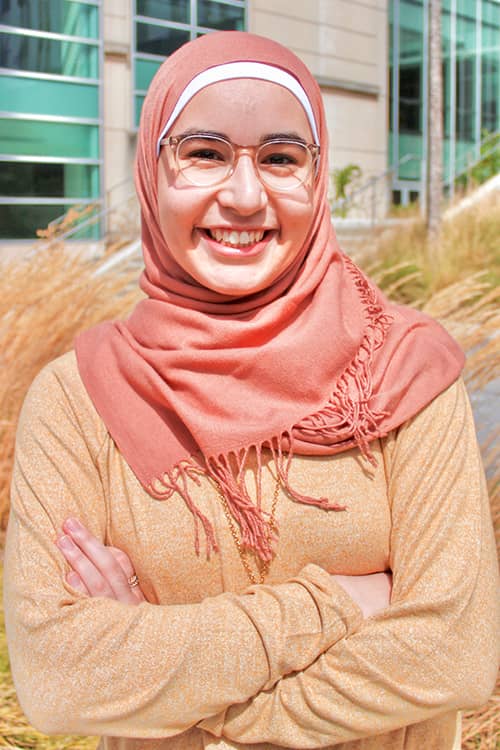
Kawther Rouabhi, Undergraduate student, Computer Science and Engineering
Uses A.I. to explore space
• Hometown: Iowa City, Iowa
• Faculty mentors/advisors: Dr. Ananya Sen Gupta, Assistant Professor, Department of Electrical and Computer Engineering; and Dr. Allison Jaynes, Assistant Professor, Department of Physics and Astronomy
• What is your degree program and expected graduate date? Computer Science and Engineering (Bachelors of Science and Engineering); Expected Graduation: May 2022
• Please describe your research: I program algorithms to analyze data collected on NASA missions, in deep space and right here on Earth. One of my projects involves creating an algorithm to automatically detect and analyze solar wind ion trails in the Martian ionosphere. Another project of mine involves creating an artificial intelligence program that detects pulsating aurora borealis events, a specific type of Northern lights.
• In simple terms, why does this research matter? My research on Martian solar wind ion trails may lead to discoveries on how the Sun interacts with planets that do not have a strong magnetic field and how solar wind can affect a planet’s atmosphere and climate. In my second project, creating a database of pulsating aurora events that our algorithm generates will provide a valuable resource for scientists studying the pulsation phenomenon and may lead to discoveries on the Sun’s interactions with Earth’s upper atmosphere and magnetic field.
• How soon after starting at the University of Iowa were you able to participate in research? I approached Dr. Ananya Sen Gupta to join her state-of-the-art signal processing research lab in the Spring of my freshman year at Iowa. During the Summer of 2020, I also began working with Dr. Allison Jaynes, a leading expert on auroras and other space weather events. I’m forever grateful for the unwavering mentorship and support of both of my research mentors.
• How has being involved in research made you more successful at the University of Iowa? From presenting alongside Dr. Sen Gupta at the 100th American Geophysical Union Fall Meeting in San Francisco to being one of two Americans building a sounding rocket with 22 international students at Andøya Space Center in Norway, I could have never imagined how far investing in my research career would take me. These eye-opening experiences forced me to jump out of my comfort zone, which made them such valuable learning opportunities. Meeting scientists and engineers from around the world with similar aspirations to my own made me ecstatic to be a part of such a vibrant community.
• What are your career goals and/or plans after graduation? Following my graduation from the University of Iowa, I hope to extend my computer engineering education as a doctoral student, where I will continue to conduct innovative AI research. Wherever my career takes me, from analyzing the melting of ice caps to volcanic activity to black hole formation, I will strive to make discoveries that drive humanity forward. As a woman and minority in the tech community, I have a mission to show underrepresented individuals that they are capable of being great problem solvers.
Banner location: online—
